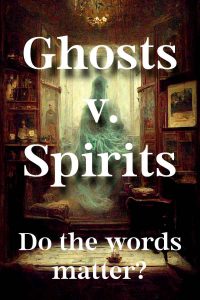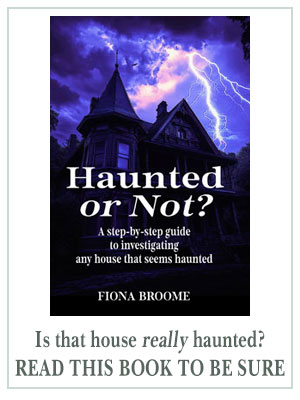 The words we use in ghost hunting can be confusing. That’s partly because we’re describing a variety of phenomena and experiences.
The words we use in ghost hunting can be confusing. That’s partly because we’re describing a variety of phenomena and experiences.
In general, if a site is supposed to be haunted, many people describe all sorts of eerie encounters as “ghostly.”
However, if we feel the presence of a friend or relative at the time of their passing, we’re more likely to use the word “spirit.”
Are they actually the same, or different? And what about “green ladies” and other helpful spirits of those who’ve crossed over, but returned to help us in times of danger or great need? Or even “residual energy hauntings“?
Many serious researchers – including me – struggle to find the best terms for what we encounter at haunted locations.
Can a dictionary help?
Let’s start with dictionary definitions.
The Oxford Dictionary says a ghost is “an apparition of a dead person which is believed to appear or become manifest to the living, typically as a nebulous image.”
How is that different from a spirit?
Well, the Oxford Dictionary defines spirit as “the nonphysical part of a person which is the seat of emotions and character; the soul.”
I’m not sure either helps us choose the best words.
What most ghost hunters say.
In ghost hunting, we often use the word “ghost” to indicate the spirit or energy associated with unexplained phenomena. It keeps conversations simple.
However…
- It might describe an actual figure, solid or translucent, that we see for just a moment before it vanishes.
- It could be poltergeist activity, meaning: objects that seem to move “by themselves,” assumed to be moved by an invisible spirit.
- We might attribute a disembodied voice – heard by one or more people, or recorded as EVP – to a ghost or spirit.
- Other sensations, physical or mental/emotional, may seem like evidence of a nearby entity. That includes a sudden chill, a sense of dread, and so on.
In general, those are all benign manifestations.
However, when a spirit seems malicious, we may use a different term, such as “demon.”
The Oxford Dictionary defines demon as “an evil spirit or devil, especially one thought to possess a person or act as a tormentor in hell.”
But what about the entity that seems hostile and territorial, but not actually evil if left alone?
And how do we describe the anxious spirit that seems to cling to their earthly home or grave site, fearful of what awaits them if and when they “cross over”?
None of this is especially helpful, especially when we add religion and spirituality to our discussions. And even within a narrow religious context, any two ghost researchers might choose contrasting labels for what they encounter at a haunted site.
I think we can all agree that some entities at haunted sites can be dangerous. We often describe them as “demonic.”
But when talking about a wide range of phenomena, let’s be considerate of others’ beliefs.
It’s fine to focus on actual, scientific research.
Don’t let anything – people around you or ghost hunting equipment – distract you from a rich experience.
Whether it’s a “ghost” or a “spirit,” or even “residual energy,” as long as it is benign, be in the moment.
That’s what real ghost hunting has always been about.

